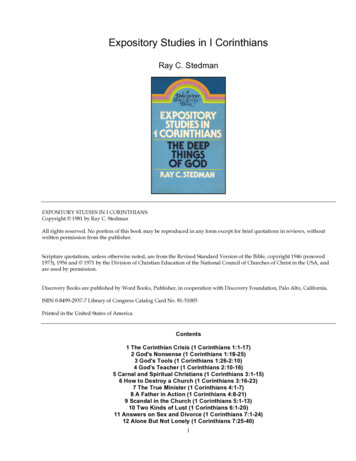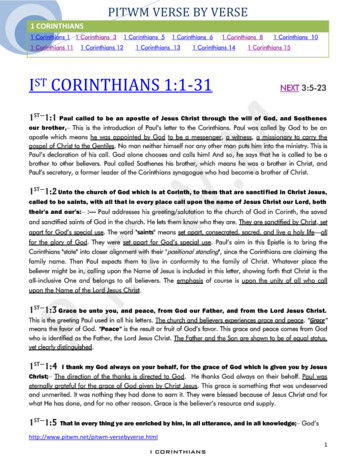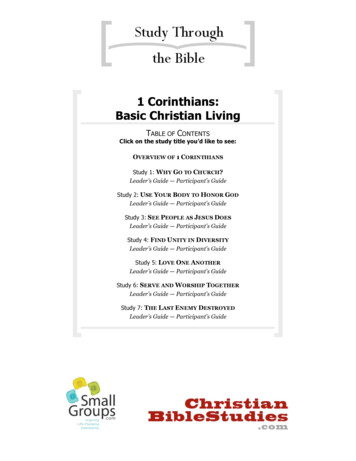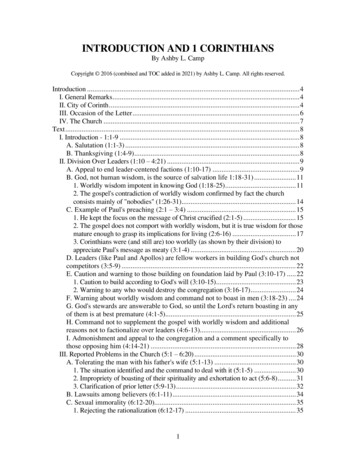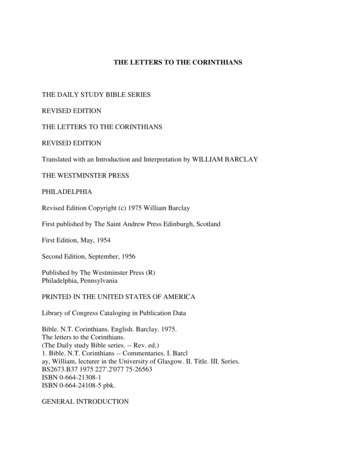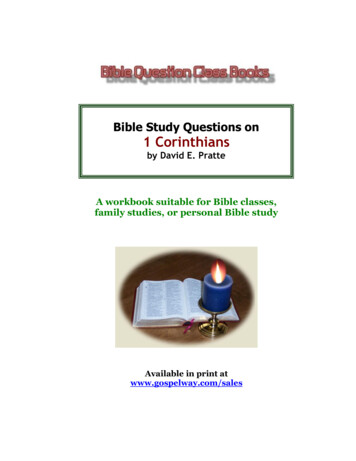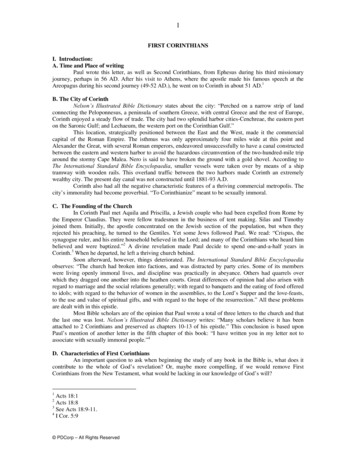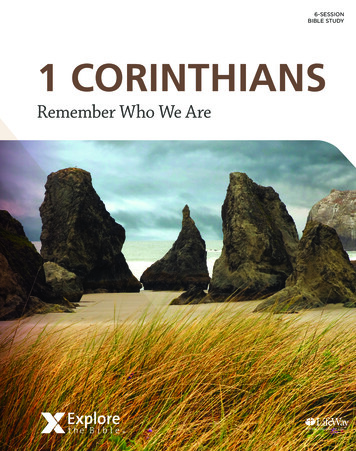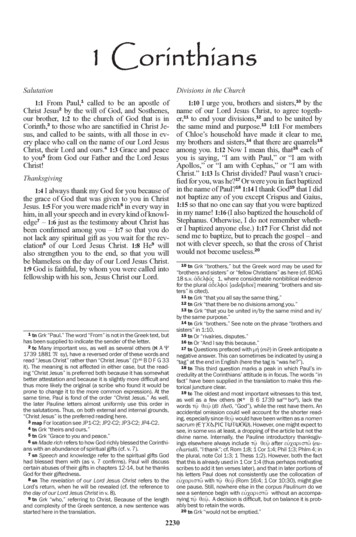
Transcription
1 CorinthiansSalutationDivisions in the Church1:1 From Paul, called to be an apostle of1:10 I urge you, brothers and sisters,10 by the Christ Jesus by the will of God, and Sosthenes,our brother, 1:2 to the church of God that is inCorinth, to those who are sanctified in Christ Jesus, and called to be saints, with all those in every place who call on the name of our Lord JesusChrist, their Lord and ours. 1:3 Grace and peaceto you from God our Father and the Lord JesusChrist! Thanksgiving1:4 I always thank my God for you because ofthe grace of God that was given to you in ChristJesus. 1:5 For you were made rich in every way inhim, in all your speech and in every kind of knowledge – 1:6 just as the testimony about Christ hasbeen confirmed among you – 1:7 so that you donot lack any spiritual gift as you wait for the revelation of our Lord Jesus Christ. 1:8 He willalso strengthen you to the end, so that you willbe blameless on the day of our Lord Jesus Christ.1:9 God is faithful, by whom you were called intofellowship with his son, Jesus Christ our Lord. tn Grk “Paul.” The word “From” is not in the Greek text, buthas been supplied to indicate the sender of the letter. tc Many important mss, as well as several others ( א A Ψ1739 1881 Ï sy), have a reversed order of these words andread “Jesus Christ” rather than “Christ Jesus” (Ì46 B D F G 33it). The meaning is not affected in either case, but the reading “Christ Jesus” is preferred both because it has somewhatbetter attestation and because it is slightly more difficult andthus more likely the original (a scribe who found it would beprone to change it to the more common expression). At thesame time, Paul is fond of the order “Christ Jesus.” As well,the later Pauline letters almost uniformly use this order inthe salutations. Thus, on both external and internal grounds,“Christ Jesus” is the preferred reading here. map For location see JP1-C2; JP2-C2; JP3-C2; JP4-C2. tn Grk “theirs and ours.” tn Grk “Grace to you and peace.” sn Made rich refers to how God richly blessed the Corinthians with an abundance of spiritual gifts (cf. v. 7). sn Speech and knowledge refer to the spiritual gifts Godhad blessed them with (as v. 7 confirms). Paul will discusscertain abuses of their gifts in chapters 12-14, but he thanksGod for their giftedness. sn The revelation of our Lord Jesus Christ refers to theLord’s return, when he will be revealed (cf. the reference tothe day of our Lord Jesus Christ in v. 8). tn Grk “who,” referring to Christ. Because of the lengthand complexity of the Greek sentence, a new sentence wasstarted here in the translation.name of our Lord Jesus Christ, to agree together,11 to end your divisions,12 and to be united bythe same mind and purpose.13 1:11 For membersof Chloe’s household have made it clear to me,my brothers and sisters,14 that there are quarrels15among you. 1:12 Now I mean this, that16 each ofyou is saying, “I am with Paul,” or “I am withApollos,” or “I am with Cephas,” or “I am withChrist.” 1:13 Is Christ divided? Paul wasn’t crucified for you, was he?17 Or were you in fact baptizedin the name of Paul?18 1:14 I thank God19 that I didnot baptize any of you except Crispus and Gaius,1:15 so that no one can say that you were baptizedin my name! 1:16 (I also baptized the household ofStephanus. Otherwise, I do not remember whether I baptized anyone else.) 1:17 For Christ did notsend me to baptize, but to preach the gospel – andnot with clever speech, so that the cross of Christwould not become useless.2010 tn Grk “brothers,” but the Greek word may be used for“brothers and sisters” or “fellow Christians” as here (cf. BDAG18 s.v. ἀδελφός 1, where considerable nonbiblical evidencefor the plural ἀδελφοί [adelfoi] meaning “brothers and sisters” is cited).11 tn Grk “that you all say the same thing.”12 tn Grk “that there be no divisions among you.”13 tn Grk “that you be united in/by the same mind and in/by the same purpose.”14 tn Grk “brothers.” See note on the phrase “brothers andsisters” in 1:10.15 tn Or “rivalries, disputes.”16 tn Or “And I say this because.”17 tn Questions prefaced with μή (mh) in Greek anticipate anegative answer. This can sometimes be indicated by using a“tag” at the end in English (here the tag is “was he?”).18 tn This third question marks a peak in which Paul’s incredulity at the Corinthians’ attitude is in focus. The words “infact” have been supplied in the translation to make this rhetorical juncture clear.19 tc The oldest and most important witnesses to this text,as well as a few others ( *א B 6 1739 sams bopt), lack thewords τῷ θεῷ (tw qew, “God”), while the rest have them. Anaccidental omission could well account for the shorter reading, especially since θεῷ would have been written as a nomensacrum (eucaristwtwqMw). However, one might expect tosee, in some mss at least, a dropping of the article but not thedivine name. Internally, the Pauline introductory thanksgivings elsewhere always include τῷ θεῷ after εὐχαριστῶ (eucaristw, “I thank”; cf. Rom 1:8; 1 Cor 1:4; Phil 1:3; Phlm 4; inthe plural, note Col 1:3; 1 Thess 1:2). However, both the factthat this is already used in 1 Cor 1:4 (thus perhaps motivatingscribes to add it ten verses later), and that in later portions ofhis letters Paul does not consistently use the collocation ofεὐχαριστῶ with τῷ θεῷ (Rom 16:4; 1 Cor 10:30), might giveone pause. Still, nowhere else in the corpus Paulinum do wesee a sentence begin with εὐχαριστῶ without an accompanying τῷ θεῷ. A decision is difficult, but on balance it is probably best to retain the words.20 tn Grk “would not be emptied.”2230
2231The Message of the Cross1:18 For the message about the cross is fool-ishness to those who are perishing, but to us whoare being saved it is the power of God. 1:19 Forit is written, “I will destroy the wisdom of thewise, and I will thwart the cleverness of the intelligent.” 1:20 Where is the wise man? Where isthe expert in the Mosaic law? Where is the debater of this age? Has God not made the wisdomof the world foolish? 1:21 For since in the wisdomof God the world by its wisdom did not knowGod, God was pleased to save those who believeby the foolishness of preaching. 1:22 For Jews demand miraculous signs and Greeks ask for wisdom, 1:23 but we preach about a crucified Christ, a stumbling block to Jews and foolishness to Gentiles. 1:24 But to those who are called, both Jewsand Greeks, Christ is the power of God and thewisdom of God. 1:25 For the foolishness of God iswiser than human wisdom, and the weakness ofGod is stronger than human strength. 1:26 Think about the circumstances of yourcall, brothers and sisters. Not many were wiseby human standards, not many were powerful,not many were born to a privileged position. 1:27 But God chose what the world thinks foolish to shame the wise, and God chose what theworld thinks weak to shame the strong. 1:28 Godchose10 what is low and despised in the world,what is regarded as nothing, to set aside what isregarded as something, 1:29 so that no one canboast in his presence. 1:30 He is the reason youhave a relationship with Christ Jesus,11 who sn A quotation from Isa 29:14. tn Grk “the scribe.” Thetraditional rendering ofγραμματεύς (grammateus) as “scribe” does not communicate much to the modern English reader, for whom the termmight mean “professional copyist,” if it means anything at all.The people referred to here were recognized experts in thelaw of Moses and in traditional laws and regulations. Thus“expert in the Mosaic law” comes closer to the meaning forthe modern reader. tn Or “Messiah”; Grk “preach Christ [Messiah] crucified,”giving the content of the message. tn Grk “than men.” tn Grk “than men.” tn Grk “Think about your calling.” “Calling” in Paul’s writings usually refers to God’s work of drawing people to faith inChrist. The following verses show that “calling” here stands bymetonymy for their circumstances when they became Christians, leading to the translation “the circumstances of yourcall.” tn Grk “brothers.” See note on the phrase “brothers andsisters” in 1:10. tn Grk “according to the flesh.” tn The Greek word ευγενής (eugenhs) refers to the statusof being born into nobility, wealth, or power with an emphasison the privileges and benefits that come with that position.10 tn Here καί (kai) has not been translated because of differences between Greek and English style.11 tn Grk “of him you are in Christ Jesus.”1 Corinthians 2:10became for us wisdom from God, and righteousness and sanctification and redemption, 1:31 sothat, as it is written, “Let the one who boasts,boast in the Lord.”122:1 When I came13 to you, brothers and sisters,14 I did not come with superior eloquence orwisdom as I proclaimed the testimony15 of God.2:2 For I decided to be concerned about nothing16among you except Jesus Christ, and him crucified.2:3 And I was with you in weakness and in fear andwith much trembling. 2:4 My conversation and mypreaching were not with persuasive words of wisdom, but with a demonstration of the Spirit and ofpower, 2:5 so that your faith would not be based onhuman wisdom but on the power of God.Wisdom from God2:6 Now we do speak wisdom among themature,17 but not a wisdom of this age or of therulers of this age, who are perishing. 2:7 Insteadwe speak the wisdom of God, hidden in a mystery, that God determined before the ages forour glory. 2:8 None of the rulers of this age understood it. If they had known it, they would nothave crucified the Lord of glory. 2:9 But just asit is written, “Things that no eye has seen, orear heard, or mind imagined,18 are the thingsGod has prepared for those who love him.”192:10 God has revealed these to us by the Spirit.12 sn A quotation from Jer 9:24. The themes of Jer 9 haveinfluenced Paul’s presentation in vv. 26-31. Jeremiah callsupon the wise, the strong, and the wealthy not to trust in theirresources but in their knowledge of the true God – and so toboast in the Lord. Paul addresses the same three areas ofhuman pride.13 tn Grk “and I, when I came.” Because of the differencebetween Greek style, which often begins sentences or clauses with “and,” and English style, which generally does not,κἀγώ (kagw) has not been translated here.14 tn Grk “brothers.” See note on the phrase “brothers andsisters” in 1:10.15 tc ‡ A few important mss (Ì46vid *א A C pc as well assome versions and fathers) read μυστήριον (musthrion,“mystery”) instead of μαρτύριον (marturion, “testimony”).But the latter has wider ms support ( א 2 B D F G Ψ 33 17391881 Ï and some versions), though not quite as impressive.μαρτύριον may have been changed by scribes in anticipationof Paul’s words in 2:7, or conversely, μυστήριον may havebeen changed to conform to 1:6. Transcriptionally, since “themystery of God/Christ” is a well-worn expression in the corpusPaulinum (1 Cor 2:7; 4:1; Eph 3:4; Col 2:2; 4:3), while “testimony of Christ” occurs in Paul only once (1 Cor 1:6, though“testimony of the Lord” appears in 2 Tim 1:8), and “testimonyof God” never, it is likely that scribes changed the text to themore usual expression. A decision is difficult in this instance,but a slight preference should be given to μαρτύριον.16 tn Grk “to know nothing.”17 tn In extrabiblical literature this word was applied to aninitiate of a mystery religion (BDAG 995 s.v. τέλειος 3, givesnumerous examples and states this was a technical term ofthe mystery religions). It could here refer to those who believed Paul’s message, the mystery of God (v. 1), and so betranslated as “those who believe God’s message.”18 tn Grk “entered the heart,” an OT expression, in whichthe heart functions like the mind.19 sn A quotation from Isa 64:4.
1 Corinthians 2:112232For the Spirit searches all things, even the deepthings of God. 2:11 For who among men knowsthe things of a man except the man’s spirit withinhim? So too, no one knows the things of God except the Spirit of God. 2:12 Now we have not received the spirit of the world, but the Spirit whois from God, so that we may know the things thatare freely given to us by God. 2:13 And we speakabout these things, not with words taught us by human wisdom, but with those taught by the Spirit,explaining spiritual things to spiritual people. 2:14 The unbeliever does not receive the things ofthe Spirit of God, for they are foolishness to him.And he cannot understand them, because they arespiritually discerned. 2:15 The one who is spiritualdiscerns all things, yet he himself is understood by no one. 2:16 For who has known the mind ofthe Lord, so as to advise him? But we have themind of Christ.Immaturity and Self-deception3:1 So, brothers and sisters, I could not speakto you as spiritual people, but instead as people ofthe flesh, as infants in Christ. 3:2 I fed you milk, not solid food, for you were not yet ready. In fact,you are still not ready, 3:3 for you are still influenced by the flesh. For since there is still jealousyand dissension among you, are you not influencedby the flesh and behaving like unregenerate people?10 3:4 For whenever someone says, “I am withPaul,” or “I am with Apollos,” are you not merelyhuman?11 tn Or “combining spiritual things with spiritual words” (i.e.,words the Spirit gives, as just described). tn Grk “natural person.” Cf. BDAG 1100 s.v. ψυχικός a,“an unspiritual pers., one who merely functions bodily, without being touched by the Spirit of God.” tn Or “evaluates.” tn Or “is evaluated” (i.e., “is subject to evaluation”); Grk“he himself is discerned,” that is, the person without the Spirit does not understand the person with the Spirit, particularlyin relation to the life of faith. sn A quotation from Isa 40:13. tn Grk “brothers.” See note on the phrase “brothers andsisters” in 1:10. tn Grk “fleshly [people]”; the Greek term here is σαρκινός(BDAG 914 s.v. 1). sn Milk refers figuratively to basic or elementary Christianteaching. Paul’s point was that the Corinthian believers hewas writing to here were not mature enough to receive moreadvanced teaching. This was not a problem at the time, whenthey were recent converts, but the problem now is that theyare still not ready. tn Or “are still merely human”; Grk “fleshly.” Cf. BDAG 914s.v. σαρκικός 2, “pert. to being human at a disappointing level of behavior or characteristics, (merely) human.” The samephrase occurs again later in this verse.10 tn Grk “and walking in accordance with man,” i.e., livinglike (fallen) humanity without the Spirit’s influence; hence,“unregenerate people.”11 tn Grk “are you not men,” i.e., (fallen) humanity withoutthe Spirit’s influence. Here Paul does not say “walking in accordance with” as in the previous verse; he actually states theCorinthians are this. However, this is almost certainly rhetorical hyperbole.3:5 What is Apollos, really? Or what is Paul?Servants through whom you came to believe, andeach of us in the ministry the Lord gave us.12 3:6 Iplanted,13 Apollos watered, but God caused it togrow. 3:7 So neither the one who plants counts foranything,14 nor the one who waters, but God whocauses the growth. 3:8 The one who plants and theone who waters work as one,15 but each will receive his reward according to his work. 3:9 We arecoworkers belonging to God.16 You are God’s field,God’s building. 3:10 According to the grace of Godgiven to me, like a skilled master-builder I laid afoundation, but someone else builds on it. Andeach one must be careful how he builds. 3:11 Forno one can lay any foundation other than what isbeing laid, which is Jesus Christ. 3:12 If anyonebuilds on the foundation with gold, silver, preciousstones, wood, hay, or straw,17 3:13 each builder’s18work will be plainly seen, for the Day19 will makeit clear, because it will be revealed by fire. And thefire20 will test what kind of work each has done.12 tn Grk “and to each as the Lord gave.”13 sn The expression I planted is generallytaken to meanthat Paul founded the church at Corinth. Later Apollos had asignificant ministry there (watered). See also v. 10.14 tn Grk “is anything.”15 tn Grk “are one.” The purpose of this phrase is to portrayunified action on the part of ministers underneath God’s sovereign control. Although they are in fact individuals, they areused by God with a single purpose to accomplish his will infacilitating growth. This emphasis is brought out in the translation “work as one.”16 tn Although 1 Cor 3:9 is frequently understood to mean,“we are coworkers with God,” such a view assumes that thegenitive θεοῦ (qeou) is associative because of its relationship to συνεργοί (sunergoi). However, not only is a genitiveof association not required by the syntax (cf. ExSyn 130), butthe context is decidedly against it: Paul and Apollos are insignificant compared to the God whom they serve (vv. 5-8).17 sn The various materials described here, both valuable(gold, silver, precious stones) and worthless (wood, hay, orstraw) refer to the quality of work built on the foundation, orpossibly to the motivation of those doing the building. Thematerials themselves have been understood (1) as deedsor (2) as people (since ultimately the passage is addressingthose who minister to others).18 tn Grk “each one’s.” Here “builder’s” is employed in thetranslation for clarity.19 tn In an attempt to clarify the referent, some translationsadd “of Christ” after “Day” (so TEV); others specify this as“judgment day” (NLT) or “the day of judgment” (CEV).sn The Day refers to the Day of the Lord Jesus Christ (cf. 1:8;5:5) when each Christian worker will appear before Christ forevaluation of his ministry. Paul’s constant motivation was tobe pleasing to the Lord in that day (2 Cor 5:9-10) and receivehis commendation (1 Cor 4:5).20 tc ‡ αὐτό (auto) is found at this point in v. 13 in a number of significant witnesses, including A B C P 33 1739 al. ButÌ46 א D Ψ 0289 1881 Ï latt lack it. The pronoun could be amotivated reading, designed to intensify Paul’s statement. Onthe other hand, it could have been deleted because the article alone made the reference already clear. In this instance,the possibility of scribal addition seems more likely thanscribal deletion, although a decision is difficult. NA27 includesthe word in brackets, indicating doubt as to its authenticity.sn It is unclear whether the phrase it will be revealed by firedescribes the Day (subject of the previous clause) or eachone’s work (subject of the clause before that).
22333:14 If what someone has built survives, he willreceive a reward. 3:15 If someone’s work is burnedup, he will suffer loss. He himself will be saved,but only as through fire.3:16 Do you not know that you are God’stemple and that God’s Spirit lives in you? 3:17 Ifsomeone destroys God’s temple, God will destroyhim. For God’s temple is holy, which is what youare.3:18 Guard against self-deception, each of you. If someone among you thinks he is wise in thisage, let him become foolish so that he can becomewise. 3:19 For the wisdom of this age is foolishnesswith God. As it is written, “He catches the wisein their craftiness.” 3:20 And again, “The Lordknows that the thoughts of the wise are futile.” 3:21 So then, no more boasting about mere mortals! For everything belongs to you, 3:22 whetherPaul or Apollos or Cephas or the world or life ordeath or the present or the future. Everything belongs to you, 3:23 and you belong to Christ, andChrist belongs to God.The Apostles’ Ministry1 Corinthians 5:14:7 For who concedes you any superiority? Whatdo you have that you did not receive? And if youreceived it, why do you boast as though you didnot? 4:8 Already you are satisfied! Already you arerich! You have become kings without us! I wishyou had become kings so that we could reign withyou! 4:9 For, I think, God has exhibited us apostleslast of all, as men condemned to die, because wehave become a spectacle to the world, both to angels and to people. 4:10 We are fools for Christ, butyou are wise in Christ! We are weak, but you arestrong! You are distinguished, we are dishonored!4:11 To the present hour we are hungry and thirsty,poorly clothed, brutally treated, and without a roofover our heads. 4:12 We do hard work, toiling withour own hands. When we are verbally abused, werespond with a blessing, when persecuted, we endure, 4:13 when people lie about us, we answer in afriendly manner. We are the world’s dirt and scum,even now.A Father’s Warning4:14 I am not writing these things to shame you,but to correct you as my dear children. 4:15 Forthough you may have ten thousand guardians inChrist, you do not have many fathers, because Ibecame your father in Christ Jesus through thegospel. 4:16 I encourage you, then, be imitators ofme. 4:17 For this reason, I have sent Timothy toyou, who is my dear and faithful son in the Lord.He will remind you of my ways in Christ,11 as Iteach them everywhere in every church. 4:18 Somehave become arrogant,12 as if I were not coming toyou. 4:19 But I will come to you soon, if the Lord iswilling, and I will find out not only the talk of thesearrogant people, but also their power. 4:20 For thekingdom of God is demonstrated not in idle talkbut with power. 4:21 What do you want? Shall Icome to you with a rod of discipline13 or with loveand a spirit of gentleness?4:1 One should think about us this way – asservants of Christ and stewards of the mysteriesof God. 4:2 Now what is sought in stewards is thatone be found faithful. 4:3 So for me, it is a minormatter that I am judged by you or by any humancourt. In fact, I do not even judge myself. 4:4 For Iam not aware of anything against myself, but I amnot acquitted because of this. The one who judgesme is the Lord. 4:5 So then, do not judge anythingbefore the time. Wait until the Lord comes. Hewill bring to light the hidden things of darknessand reveal the motives of hearts. Then each willreceive recognition from God.4:6 I have applied these things to myself andApollos because of you, brothers and sisters,10so that through us you may learn “not to go beyond what is written,” so that none of you willbe puffed up in favor of the one against the other. Church Discipline5:1 It is actually reported that sexual immorality exists among you, the kind of immorality tn The translation “[will] be punished” is given here byBDAG 428 s.v. ζημιόω 2. But the next clause says “he will bedelivered” and so “suffering loss” is more likely to refer to thedestruction of the “work” by fire or the loss of the reward thatcould have been gained. sn You are God’s temple refers here to the church, sincethe pronoun you is plural in the Greek text. (In 6:19 the sameimagery is used in a different context to refer to the individualbeliever.) tn Grk “let no one deceive himself.” sn A quotation from Job 5:13. sn A quotation from Ps 94:11. tn Grk “so then, let no one boast in men.” tn Here ἄνθρωπος (anqrwpos) is both indefinite and general, “one”; “a person” (BDAG 81 s.v. 4.a.γ). tn Grk “time, until the Lord comes, who will bring to light.” tn Or “praise.”10 tn Grk “brothers.” See note on the phrase “brothers andsisters” in 1:10.11 tc ‡ Several important mss read Ιησοῦ (Ihsou, “Jesus”)after Χριστῷ (Cristw, “Christ”) in v. 17 (so Ì46 א C D1 331739 al). Western mss have κυρίῳ Ιησοῦ (kuriw Ihsou,“Lord Jesus”; D* F G), while several significant mss, as wellas the majority, have only Χριστῷ here (A B D2 Ψ Ï sa).Once Ιησοῦ got into the text, it would continue to be copied.There is however no easy explanation for the word lacking inso many witnesses. Thus the shorter reading appears to beoriginal. NA27 includes Ιησοῦ in brackets, indicating doubt asto its authenticity.12 tn Grk “puffed up”; “inflated.”13 tn Grk “rod.” Context indicates that this rod will be usedfor disciplinary purposes.sn Paul is using the term rod in this context to refer to hisapostolic authority to discipline those who have become arrogant in the Corinthian church and have attempted to undermine his ministry (cf. 4:18-19).
1 Corinthians 5:22234that is not permitted even among the Gentiles, sothat someone is cohabiting with his father’s wife.5:2 And you are proud! Shouldn’t you have beendeeply sorrowful instead and removed the one whodid this from among you? 5:3 For even though Iam absent physically, I am present in spirit. AndI have already judged the one who did this, just asthough I were present. 5:4 When you gather together in the name of our Lord Jesus, and I amwith you in spirit, along with the power of ourLord Jesus, 5:5 turn this man over to Satan for thedestruction of the flesh, so that his spirit may besaved in the day of the Lord.9 tn Or “someone has married”; Grk “someone has,” butthe verb ἔχω (ecw) is routinely used of marital relationships(cf. BDAG 420 s.v. 2.a), including sexual relationships. The exact nature of the relationship is uncertain in this case; it is notclear, for example, whether the man had actually married thewoman or was merely cohabiting with her. tn Or “are puffed up/arrogant,” the same verb occurringin 4:6, 18. tn Grk “sorrowful, so that the one who did this might beremoved.” tn Grk “in body.” tn Verse 3 is one sentence in Greek (“For – even thoughI am absent in body, yet present in spirit – I have alreadyjudged the one who did this, as though I were present”) thathas been broken up due to English stylistic considerations. tc On the wording “our Lord Jesus” (τοῦ κυρίου ἡμῶν Ιησοῦ, tou kuriou Jhmwn Ihsou) there is some variationin the extant witnesses: ἡμῶν is lacking in א A Ψ 1505 pc;Χριστοῦ (Cristou, “Christ”) is found after Ιησοῦ in Ì46 א D2F G 33 1881 Ï co and before Ιησοῦ in 81. The wording τοῦκυρίου ἡμῶν Ιησοῦ is read by B D* 1175 1739 pc. Concerning Χριστοῦ, even though the external evidence for thisis quite good, it may well be a motivated reading. Elsewhere inPaul the expression “our Lord Jesus” is routinely followed by“Christ” (e.g., Rom 5:1, 11; 15:6, 30; 1 Cor 1:2, 7, 10; 15:57;2 Cor 8:9; Gal 6:14, 18, Eph 1:3, 17; 5:20; 6:24; Col 1:3; 1Thess 1:3; 5:9, 23, 28). Less commonly, the wording is simply“our Lord Jesus” (e.g., Rom 16:20; 2 Cor 1:14; 1 Thess 2:19;3:11, 13; 2 Thess 1:8, 12). A preference should thus be givento the shorter reading. As for the ἡμῶν, it is very difficult todecide: “the Lord Jesus” occurs as often as “our Lord Jesus”(cf. 1 Cor 11:23; 16:23; 2 Cor 4:14; 11:31; Eph 1:15; 1 Thess4:2; 2 Thess 1:7; Phlm 5). Although scribes would tend to expand on the text, the only witnesses that have “the Lord Jesus” (without “our” or “Christ”) are A Ψ 1505 pc. On balance,then, “our Lord Jesus” is the best reading in this verse. tn Verses 4b-5a are capable of various punctuations: (1)“and I am with you in spirit, through the power of our Lord Jesus turn this man over to Satan”; (2) “and I am with you inspirit with the power of our Lord Jesus, turn this man over toSatan”; (3) “and I am with you in spirit, along with the powerof our Lord Jesus, turn this man over to Satan” (as adopted inthe text). The first option suggests the Lord’s power is neededwhen the church is to hand the man over to Satan; the second option suggests that the Lord’s power is present whenPaul is gathered with the Corinthians in spirit; the third option leaves the relation of the Lord’s power to the surroundingphrases vague, perhaps implying that both are in view. tn Or perhaps “turn this man over to Satan for the destruction of your fleshly works, so that your spirit may be saved ”;Grk “for the destruction of the flesh, so that the spirit may besaved.” This is one of the most difficult passages in the NT,and there are many different interpretations regarding whatis in view here. (1) Many interpreters see this as some sortof excommunication (“turn this man over to Satan”) which inturn leads to the man’s physical death (“the destruction of theflesh”), resulting in the man’s ultimate salvation (“that [his]spirit may be saved ”). (2) Others see the phrase “destructionof the flesh” as referring to extreme physical suffering or illnessthat stops short of physical death, thus leading the offender5:6 Your boasting is not good. Don’t youknow that a little yeast10 affects11 the whole batch ofdough? 5:7 Clean out the old yeast so that you maybe a new batch of dough – you are, in fact, without yeast. For Christ, our Passover lamb, has beensacrificed. 5:8 So then, let us celebrate the festival,not with the old yeast, the yeast of vice and evil,but with the bread without yeast, the bread of sincerity and truth.125:9 I wrote you in my letter not to associatewith sexually immoral people. 5:10 In no waydid I mean the immoral people of this world, orthe greedy and swindlers and idolaters, since youwould then have to go out of the world. 5:11 Butnow I am writing to you not to associate with anyone who calls himself a Christian13 who is sexually immoral, or greedy, or an idolater, or verballyabusive,14 or a drunkard, or a swindler. Do noteven eat with such a person. 5:12 For what do Ihave to do with judging those outside? Are younot to judge those inside? 5:13 But God will judgethose outside. Remove the evil person from amongyou.15to repentance and salvation. (3) A number of scholars (e.g. G.D. Fee, First Corinthians [NICNT], 212-13) take the referenceto the “flesh” to refer to the offender’s “sinful nature” or “carnal nature,” which is “destroyed” by placing him outside thechurch, back in Satan’s domain (exactly how this “destruction”is accomplished is not clear, and is one of the problems withthis view). (4) More recently some have argued that neither the“flesh” nor the “spirit” belong to the offender, but to the churchcollectively; thus it is the “fleshly works” of the congregationwhich are being destroyed by the removal of the offender (cf.5:13) so that the “spirit,” the corporate life of the church livedin union with God through the Holy Spirit, may be preserved (cf.5:7-8). See, e.g., B. Campbell, “Flesh and Spirit in 1 Cor 5:5: AnExercise in Rhetorical Criticism of the NT,” JETS 36 (1993): 33142. The alternate tr
1 Corinthians 30 Salutation 1:1 From Paul, called to be an apostle of Christ Jesus by the will of God, and Sosthenes, our brother, 1: to the church of God that is in Corinth, to those who are sanctified in Christ Je- sus, and called to be saints, with all those in ev-ery place who call on the name of our Lord JesusFile Size: 1MB
